Key takeaways:
- Self-efficacy, defined by Albert Bandura, influences individual confidence and resilience in overcoming challenges and pursuing opportunities.
- Workshops benefit significantly from fostering self-efficacy, leading to increased participant engagement, creativity, and collaborative learning.
- Strategies to boost self-efficacy include small wins, positive reinforcement, and mentorship, enhancing participants’ confidence and willingness to contribute.
- Measuring self-efficacy through surveys and observing group interactions reveals significant changes in participants’ confidence and collaborative dynamics.
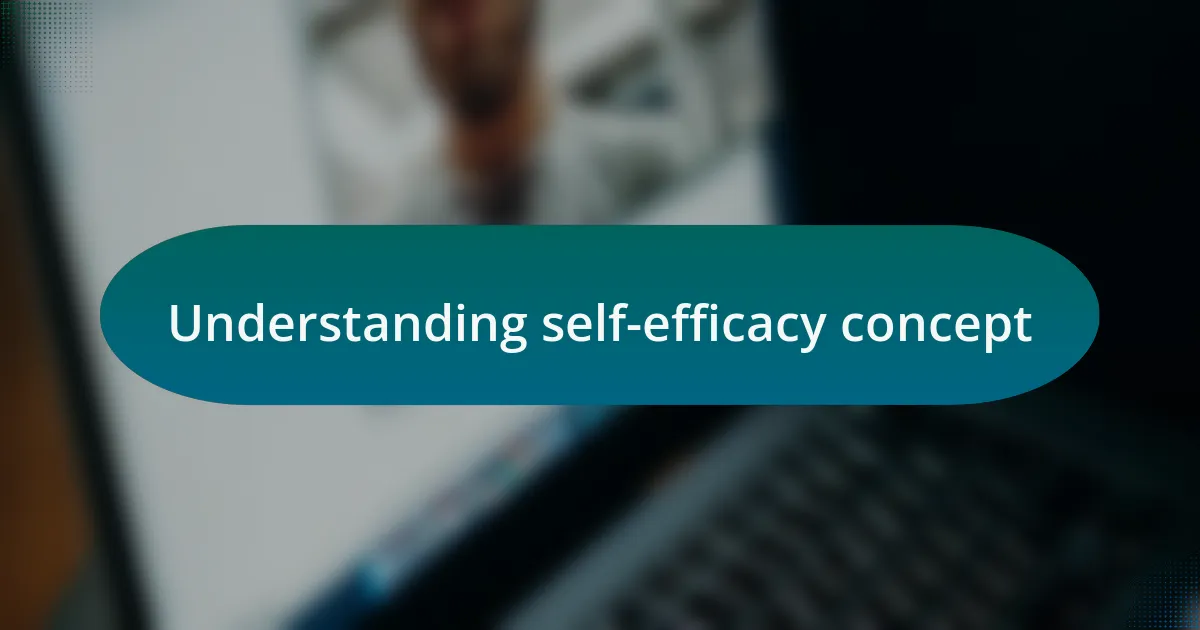
Understanding self-efficacy concept
Self-efficacy, a term popularized by psychologist Albert Bandura, refers to an individual’s belief in their ability to succeed in specific situations. I remember once feeling overwhelmed before presenting at a tech conference. It was a challenge to believe in my skills, but that moment of self-doubt made me realize the importance of self-efficacy in overcoming obstacles.
This concept doesn’t just affect outcomes; it shapes how we approach tasks and challenges. For instance, think about a time when you opted out of a project because you doubted your abilities. What if you had trusted yourself instead? Embracing self-efficacy can transform your mindset, making you more resilient and open to opportunities.
At its core, self-efficacy is about confidence in one’s capabilities. It’s fascinating how a simple affirmation, like reminding myself of past successes, can invigorate my belief in tackling new projects. By nurturing self-efficacy, we not only enhance our performance but also foster a growth mindset, encouraging constant learning and improvement.
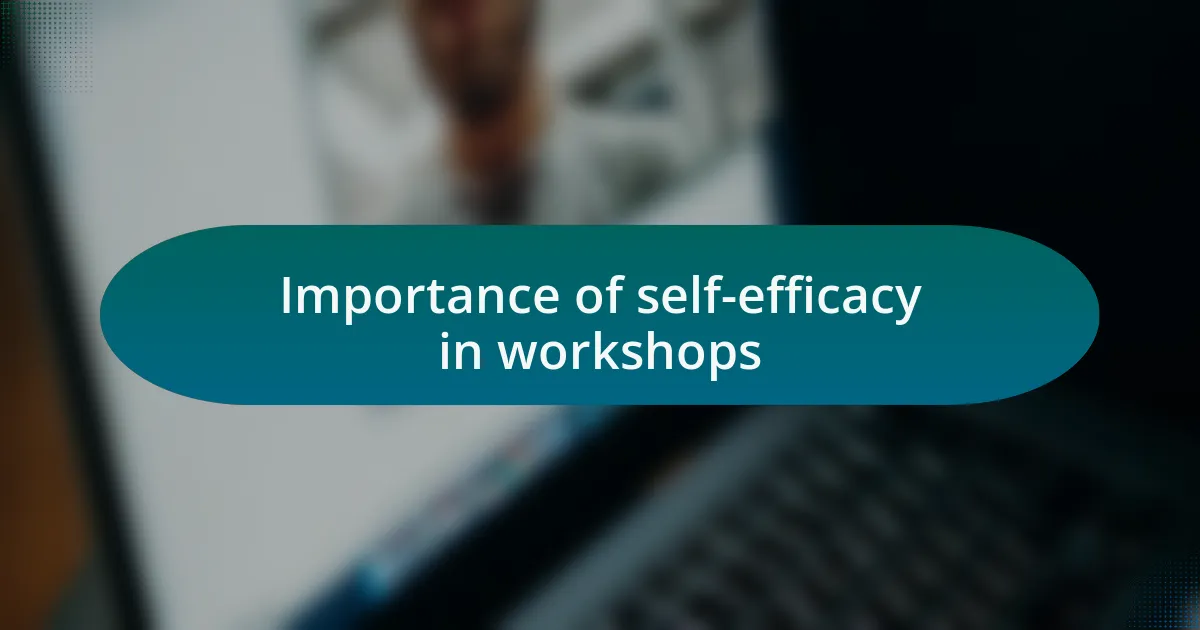
Importance of self-efficacy in workshops
Self-efficacy plays a crucial role in the effectiveness of workshops. I recall a particular workshop on coding where participants hesitated to share their ideas. When I encouraged them to believe in their skills, the atmosphere shifted dramatically. Those initial moments of doubt transformed into bursts of creativity as participants realized they had valuable insights to contribute.
When attendees feel confident in their abilities, they engage more actively, leading to richer discussions and collaborative learning experiences. Have you ever been in a workshop where the energy was flat? It’s often a lack of self-efficacy at play. By fostering an environment where individuals feel empowered, we not only boost participation but also enhance overall learning outcomes.
Moreover, self-efficacy can ripple through a group, inspiring a collective sense of achievement. I once led a session where members shared their stories of overcoming technical challenges. Those moments reinforced the idea that everyone has strengths, igniting motivation and camaraderie. This sense of collective efficacy can elevate the entire workshop experience, making it not just a place of learning, but also a supportive community where everyone can thrive.
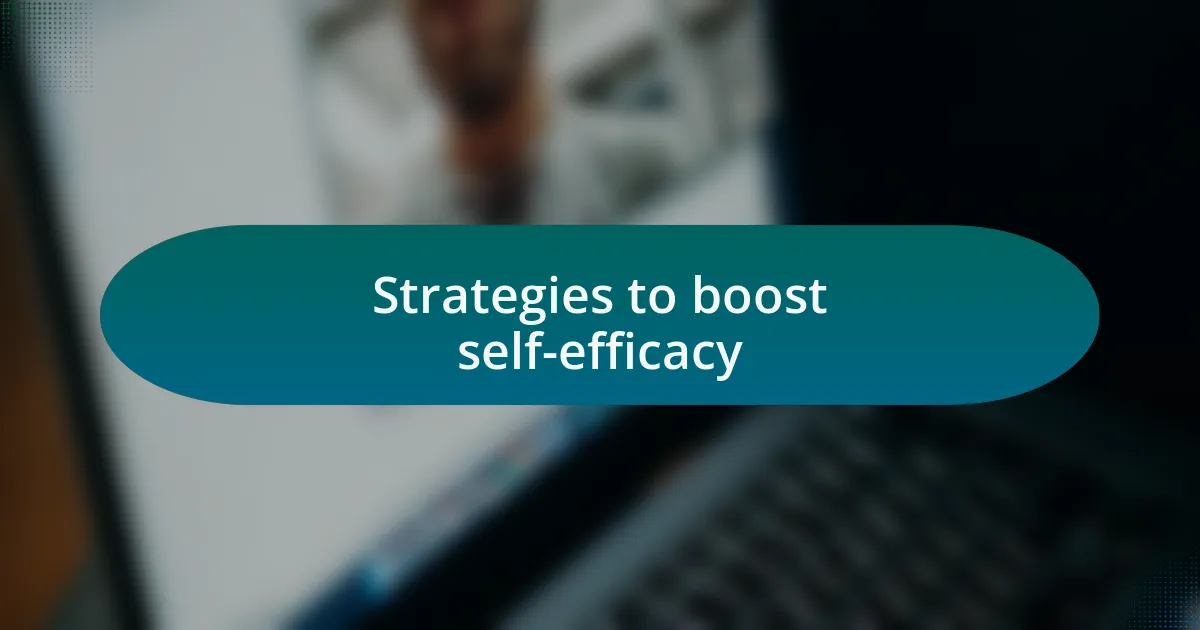
Strategies to boost self-efficacy
One effective strategy to boost self-efficacy is employing small wins. During a recent workshop I facilitated, I introduced brief, manageable activities where participants could quickly experience success—like solving a puzzle related to their field. The palpable excitement and sense of achievement they generated were evident; I noticed how their confidence grew after each small success, motivating them to tackle more complex challenges.
Another approach is to use positive reinforcement. I often share my own experiences of overcoming setbacks, which helps create a relatable atmosphere. When participants hear that even someone like me faced hurdles, they realize that struggles are a part of the learning process. This shared vulnerability can spark a sense of belonging and assurance that they, too, can conquer their doubts.
Creating a mentorship vibe within the workshop can be transformative. In one instance, I paired more experienced participants with those who were just starting out. I could see the shift—the newer attendees felt buoyed by the support and guidance, which led them to take risks they otherwise wouldn’t have. Isn’t it fascinating how a little encouragement can unlock potential? That kind of supportive dynamic fosters a culture where self-efficacy thrives and everyone feels empowered to contribute.
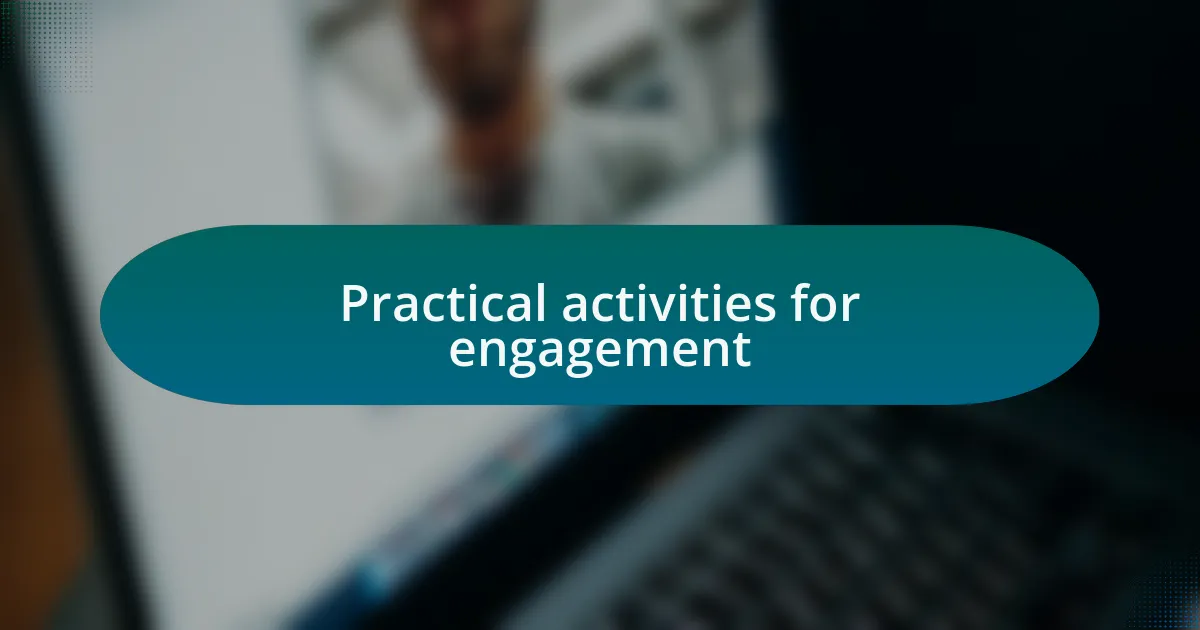
Practical activities for engagement
Practical activities that foster engagement can be remarkable in workshops. For instance, I once organized a “speed networking” session where participants quickly shared their projects with varied backgrounds. The energy in the room was contagious; I could see how those brief exchanges not only sparked new ideas but also cultivated a feeling of accomplishment. It’s incredible to witness the instant sense of connection and confidence that can arise from a simple conversation.
Another effective method is incorporating hands-on technology challenges. During a recent event, I had participants collaborate in small groups to develop a mock app prototype. This practical engagement not only encouraged teamwork but also allowed them to see their ideas come to life. Reflecting on this experience, I realized how the thrill of creation kindles a sense of ownership and responsibility. When participants physically manipulate tools or software, their belief in their capabilities naturally flourishes.
Do you remember your first experience tackling a challenge together with others? I often use interactive brainstorming exercises where attendees can share their wildest ideas without fear of judgment. The collective laughter and playful banter that ensues is a testament to how safe environments can drastically enhance self-efficacy. In reminding participants that their thoughts matter, I help them realize they hold the keys to innovation and problem-solving within the group. How empowering is that?
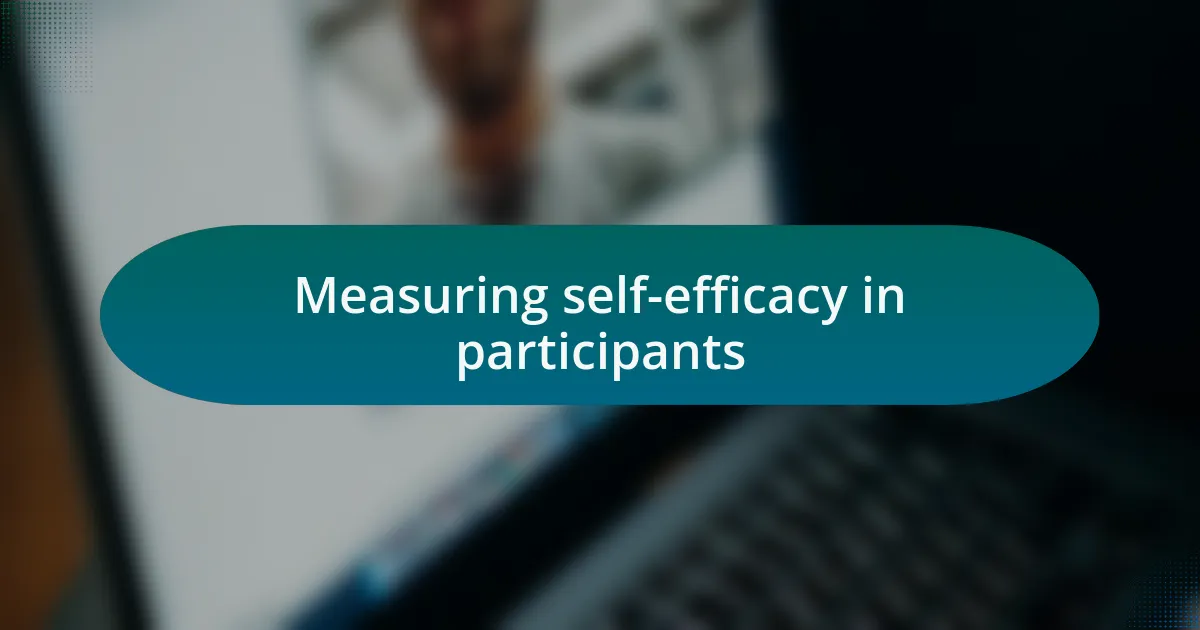
Measuring self-efficacy in participants
To gauge self-efficacy effectively, I often use pre-and post-workshop surveys that include specific questions about participants’ confidence in their abilities. For instance, I ask them to rate their comfort level when tackling a new technology. Seeing the shift in their responses, often a considerable leap in confidence, is incredibly rewarding. Have you ever noticed how just a small adjustment in perception can lead to a profound change in belief?
During one workshop, I introduced a self-efficacy scale to measure changes over time. Participants initially shared their hesitations, but by the end, many expressed newfound confidence in their technical skills. I remember one attendee thanking me for giving them a fresh perspective on their problem-solving abilities. It’s this tangible change that serves as a powerful motivator for future learning and exploration.
Additionally, observing group interactions provides invaluable qualitative insights into self-efficacy. I pay close attention to how participants engage during collaborative activities. For example, some individuals who previously hesitated to share ideas began to contribute enthusiastically. It’s a moving experience to witness that transformation—when participants realize their voice has value, it’s not just a win for them, but for the whole group dynamic. Isn’t that what we aim for in creating these collaborative environments?

Personal experiences in workshops
In my experience, workshops often serve as a fertile ground for personal growth. I recall a session where one participant, who’d been hesitant to voice their thoughts, finally spoke up during a brainstorming activity. Their idea was not only creative but pivotal to our project discussion. It reminded me of how crucial it is to create an environment where everyone feels safe to express their ideas. Can you imagine what it felt like to witness that moment of transformation?
Another memorable experience was during a technical skills workshop, where I encouraged participants to tackle challenges collaboratively. I remember one participant sharing, “I never thought I could help others with coding,” and by the end, they confidently guided their peers through complex problems. It struck me that self-efficacy isn’t just about individual belief; it often flourishes through community support. Isn’t it fascinating how a simple nudge can unlock someone’s potential?
In leading these workshops, I’ve often felt the spark of inspiration that comes when participants connect over shared challenges. At one particular event, a group rallied together to troubleshoot a software issue, and the excitement in the room was palpable. They weren’t just solving a problem; they were building each other’s confidence. How rewarding it is to witness collaboration shift participants from doubt to enthusiasm!
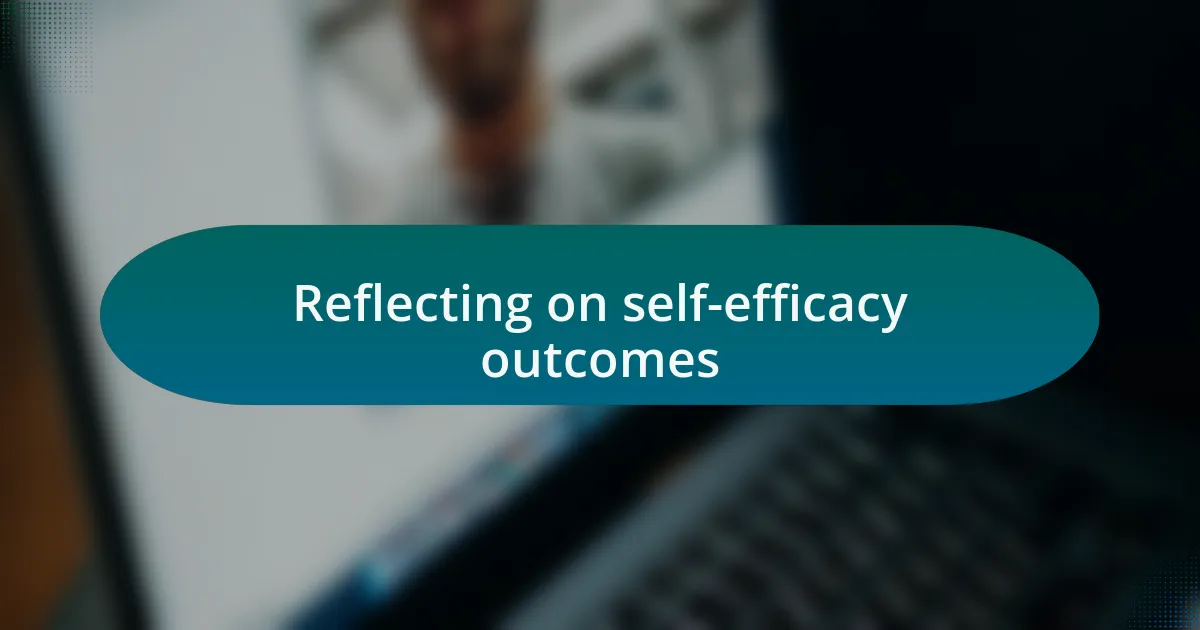
Reflecting on self-efficacy outcomes
Reflecting on participants’ self-efficacy outcomes often brings mixed emotions. I remember wrapping up a recent workshop and watching one participant, who had previously seemed unsure, leave with a newfound sense of accomplishment. They approached me afterward, saying, “I didn’t realize how much I could contribute until now,” and it struck me how powerful that realization can be in fostering long-term belief in one’s skills.
Self-efficacy can be a game changer. In another instance, during a hands-on project session, I noticed one participant adopt a leadership role, guiding others confidently through their tasks. This shift not only boosted their self-esteem but also transformed the group dynamic. I wondered, how many times do we underestimate our impact on others in such collaborative environments?
When I revisit these moments, I’m reminded of how crucial it is for us as facilitators to promote an atmosphere of encouragement. One participant shared how they spent the week after the workshop practicing their new skills and started a blog to share their experiences. Seeing them take that initiative reinforced my belief that the seeds of self-efficacy we plant can lead to remarkable growth beyond the workshop itself. Isn’t it inspiring to think about the ripple effect our guidance can have?